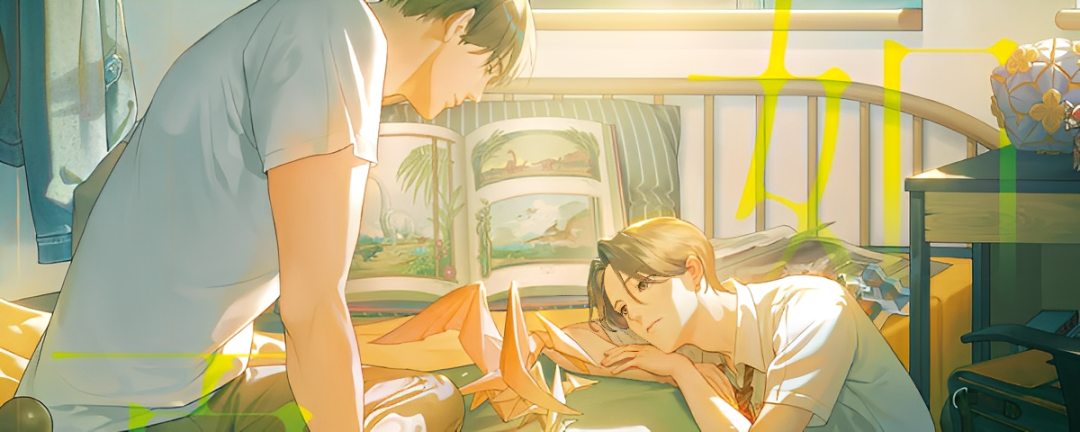BOSF 009: Friends
by cloudiesBy 8:00 p.m., Ji Yan’s brief runaway episode ended.
He first walked Xiang Yang home, then rang his own doorbell. He’d left in such a hurry he forgot his keys.
Lin Yueqin opened the door, showing no concern, as if she’d expected her son had nowhere to go. With a sharp tone, she said, “So you still know to come back for dinner.”
Despite preparing himself, Ji Yan’s heart stung. But he quickly let it go, having decided not to hold hope for his parents. He was only obedient now because he was young and dependent. When he grew up…
Ji Yan didn’t dwell on it or respond to Lin Yueqin. He took off his shoes and socks and went to the living room.
Thankfully, Lin Yueqin didn’t nag further, only saying, “Go eat.”
The cold war between mother and son seemed over yet unresolved, the home atmosphere still awkward. Ji Qiuyuan, having eaten early, was watching TV. Though Lin Yueqin told him what happened, he didn’t care much. To him, it was just a minor mother-son spat, not a big deal. Ji Yan’s runaway act wasn’t taken seriously—boys being naughty was normal.
Perhaps to mask the heavy atmosphere, Ji Qiuyuan turned up the TV volume, as if it could drown out the unease.
The next day, Ji Yan got ready for school early as usual. Despite his mother’s scolding, he didn’t plan to stop walking Xiang Yang to school. The teacher’s praise confirmed he was doing the right thing, and he no longer expected his mother’s understanding.
Seeing him up early, Lin Yueqin said nothing, preparing breakfast as usual. Until Ji Yan left, they remained silent.
At 7:30 a.m., Ji Qiuyuan left for work.
Lin Yueqin finished washing dishes, swept the floor, and tidied up. By past 9:00, she changed to go grocery shopping. As she locked the door, she saw the door across open.
Li Lilian, in a fitted dress, showed a slightly rounded belly and fuller cheeks. She greeted politely, “Mrs. Lin, do you have a moment? I need to talk…”
Lin Yueqin, good at keeping up appearances, smiled. “Nothing much, just heading to buy groceries. Come in, sit.”
The two women sat on the living room sofa, chatting.
Li Lilian chose this time knowing no one else was home, avoiding embarrassment. “Sorry, Mrs. Lin, I asked Ji Yan to help with Xiang Yang. Please don’t blame him…”
Facing a pregnant woman, Lin Yueqin kept smiling. She knew Li Lilian had deliberately approached Ji Yan instead of her, which angered her more—her son kept her in the dark. She sympathized with Xiang Yang’s situation, but her son came first. What if spending too much time with Xiang Yang affected Ji Yan’s studies?
Parents want their kids to have good friends, not bad ones. Xiang Yang wasn’t bad, but he wasn’t “normal.” Lin Yueqin worried Ji Yan would face gossip for being around him. But with the teacher’s praise already public, what could she do?
She couldn’t lash out at Li Lilian. As neighbors, they’d see each other daily; ruining relations would be awkward. Plus, with Li Lilian’s early pregnancy, upsetting her could be risky. So, Lin Yueqin swallowed her frustration, listening to Li Lilian’s complaints.
Li Lilian spoke of the hardship of raising Xiang Yang and her challenges conceiving again at her age.
As a woman, Lin Yueqin couldn’t help but empathize. Not truly hard-hearted, she was swayed by Li Lilian’s gentle words, agreeing to let Ji Yan continue walking Xiang Yang to school.
But Lin Yueqin had no intention of apologizing to Ji Yan. When the village heard about it, people praised Ji Yan to her face, and she nodded proudly. Yet at home, she withheld praise, as if doing well was expected, and doing poorly deserved scolding.
Ji Yan didn’t know this. Even if he did, at his age, he’d likely still feel his parents were unfair.
Growing up, many experience disappointment in parents, valuing friends over family. Ji Yan was no exception. After the teacher’s praise, more classmates spoke to him, giving him a sense of validation.
He began ignoring his parents’ feelings, treating them like strangers, listening to their complaints without taking them to heart or responding. To others, he was still the good kid, but he knew his obedience was a facade. He wasn’t bad—just unwilling to let his parents’ views dictate everything.
After that night’s companionship, he genuinely accepted Xiang Yang.
With validation came a sense of purpose. On the way to school, though Xiang Yang remained silent, his gaze drifting, Ji Yan spoke to him more.
He felt Xiang Yang was listening, just unable to express himself.
The school had two weekly reading periods in the library to encourage extracurricular reading. Uninterested students slept or passed notes, but Ji Yan went to the rarely visited medical section, looking for books on autism.
His family had no computer—his parents, with little education, didn’t use one and thought Ji Yan too young for a phone. With limited resources, the library was his only option. Last time, curious about autism, he’d read briefly but noticed classmates staring oddly, as if he had a strange disease.
This time, he was smarter, taking books to a secluded corner.
Perhaps because someone close had the condition, he didn’t find it dull. Unable to grasp complex terms, he focused on simple case studies, learning that successful social integration often required patient parental guidance and financial support.
Thinking of Xiang Yang’s parents and their expected new child, Ji Yan sighed.
Encouragement fuels progress. Disappointed in his parents and rebelling against his environment, Ji Yan didn’t want to give up halfway or become a hypocritical adult. He knew Xiang Yang’s future was limited but didn’t want him to only graduate junior high, unable to support himself. Xiang Yang was just unlucky to be born into an uncaring family; he wasn’t so different from others. Within his ability, Ji Yan wanted to help.
In youth, people dream, act passionately, and give without expecting reward—it’s meaningful, regardless of others’ opinions. Adults might call it foolish or childish, but youth is fleeting, never to return.
On the short walk to school, Ji Yan began teaching Xiang Yang to speak, repeating tirelessly. Most with autism have language barriers, making speech slow to develop. But language is a bridge to communication, key to integrating into society. Ji Yan had given up on communicating with his parents but hoped Xiang Yang would one day speak to him. He couldn’t say why—perhaps a way to prove his persistence was right, or because Xiang Yang’s first response thrilled him more than good grades, giving a subtle satisfaction.
Happiness was simple, without ulterior motives. He saw Xiang Yang as a friend.
Xiang Yang mostly ignored him, occasionally responding with a glance, then nothing. But over time, he improved, starting to listen and even repeating Ji Yan’s common words, especially “mm.”
That evening, the sunset stretched their shadows long.
Ji Yan noticed Xiang Yang listened but never looked at him, responding expressionlessly, his tone flat.
Stopping, Ji Yan gently held Xiang Yang’s face, fingers near his ears, blocking outside noise, turning him to face him. “Xiang Yang, when someone talks, look at their eyes.”
He’d read somewhere this encouraged focus.
Xiang Yang stopped, his gaze shifting to Ji Yan’s face. He seemed used to Ji Yan’s touch and tone, looking at him as requested, his clear eyes focused, not darting away as before. He replied, “Mm.”


0 Comments